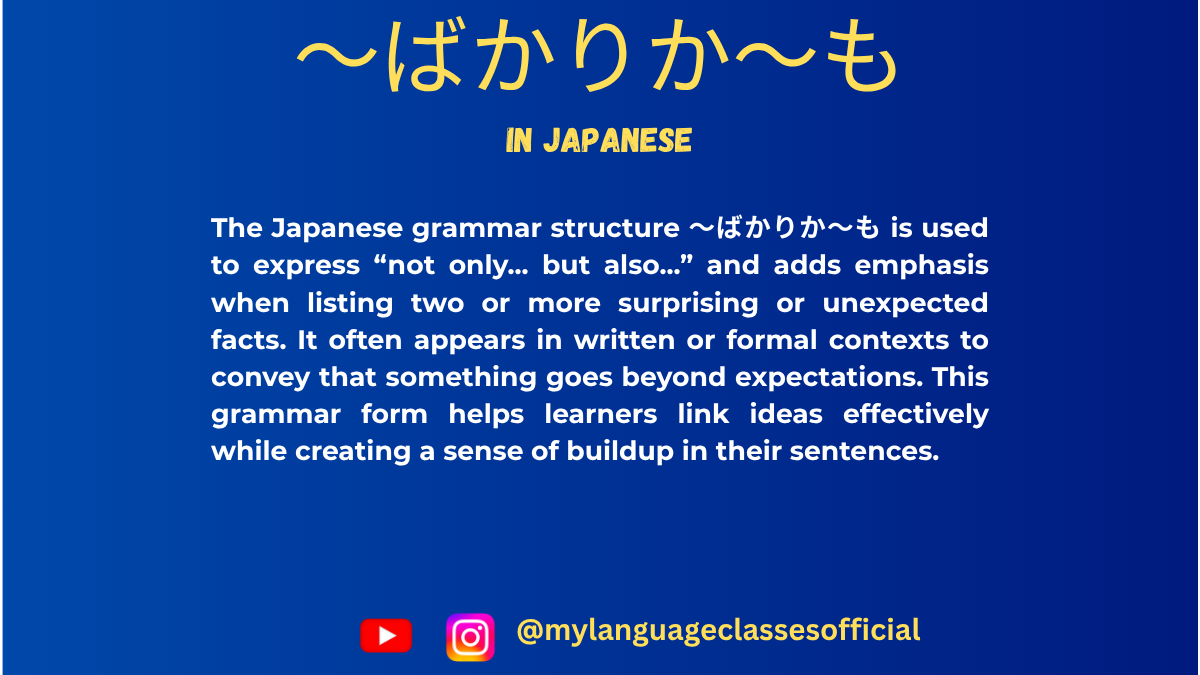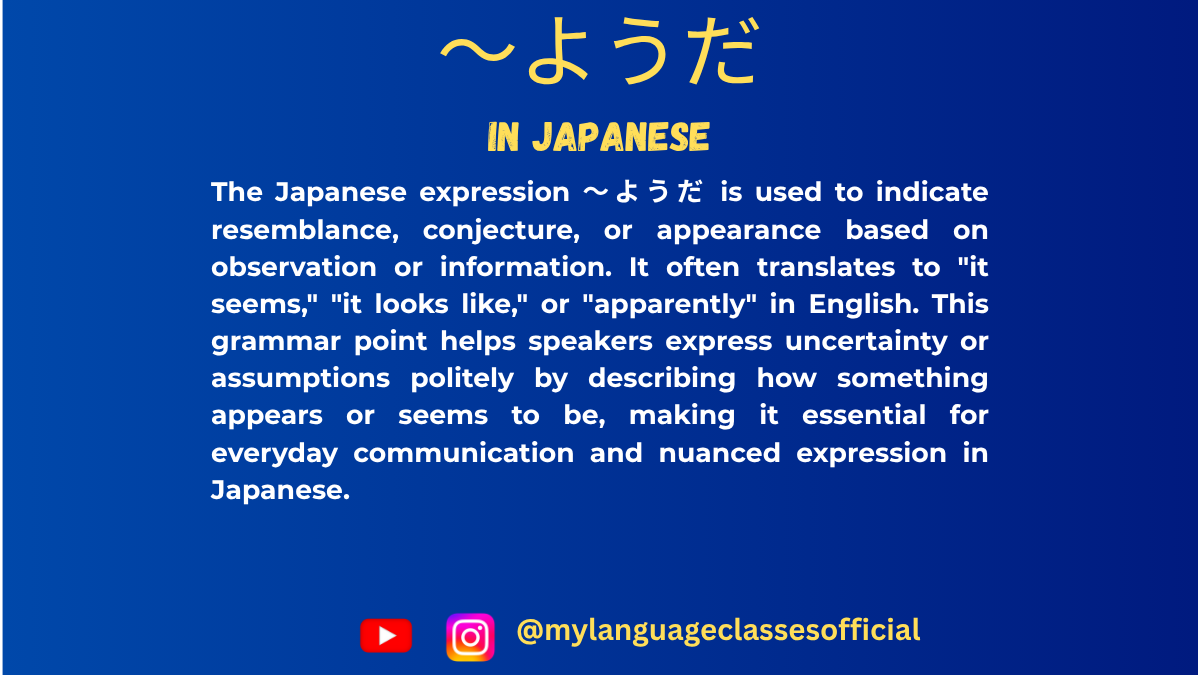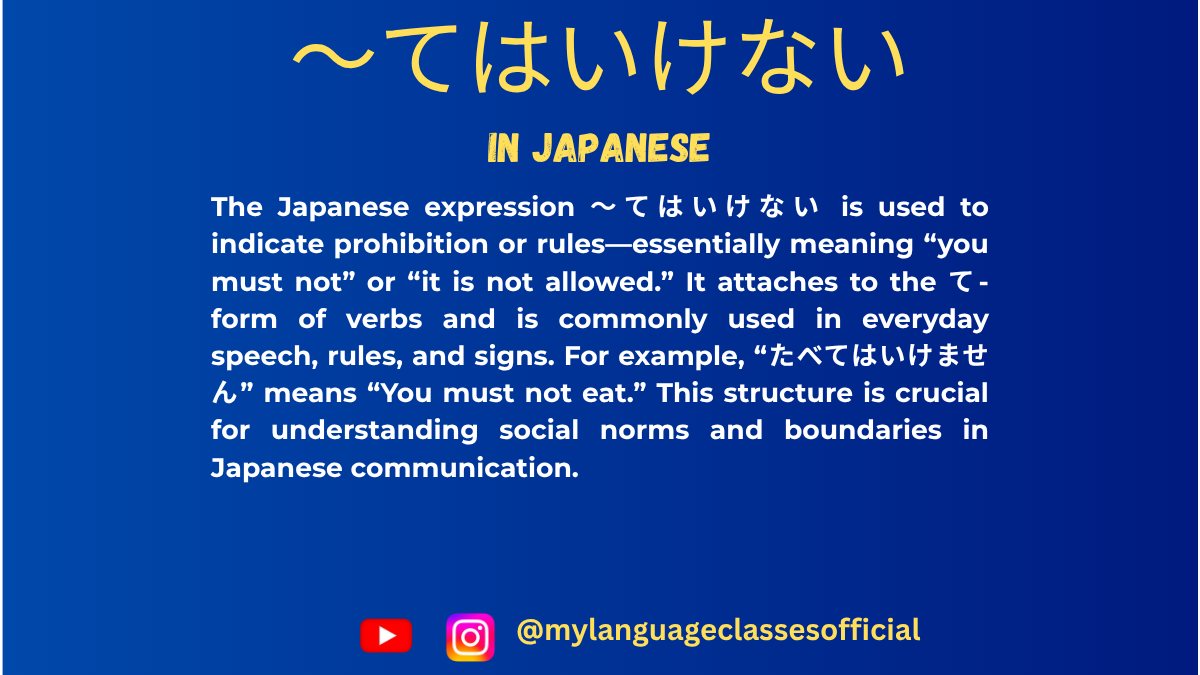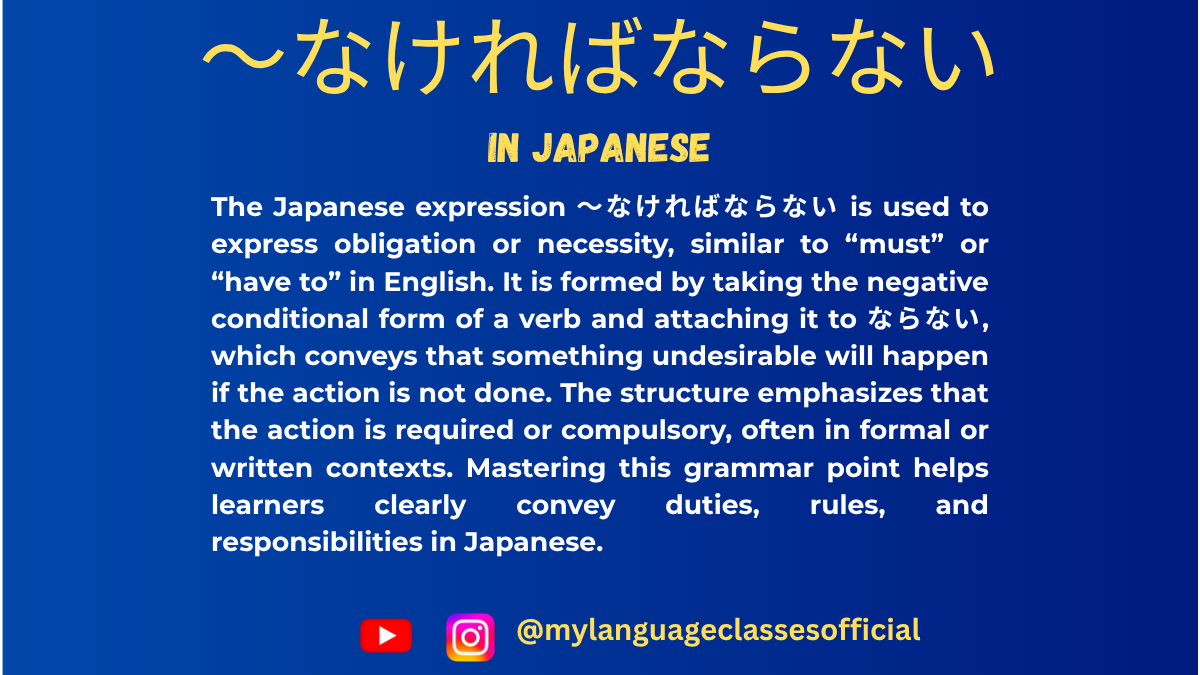Your cart is currently empty!
Tag: Japanese grammar examples
-

Using 〜ばかりか〜も in Japanese | My Language Classes
Mastering the Japanese Grammar Point: 〜ばかりか〜も
When learning Japanese, one of the most fascinating aspects is discovering how the language expresses complex ideas with seemingly simple structures. One such structure is 〜ばかりか〜も, a grammar point that allows speakers to emphasize not just one thing, but an additional, often surprising or unexpected, element. In English, this can be roughly translated as “not only… but also…” or “not just… but even…”. It’s a powerful way to add depth and nuance to your sentences, making your Japanese sound more natural and sophisticated.
In this blog post, we’ll dive deep into the formation, usage, and nuances of 〜ばかりか〜も. By the end, you’ll have a solid understanding of how to use this grammar point in various contexts, along with plenty of examples to guide you.
Formation of 〜ばかりか〜も
The structure 〜ばかりか〜も is used to connect two clauses, where the first clause introduces something expected or known, and the second clause adds something unexpected or surprising. It can be used with verbs, nouns, and adjectives. Let’s break down the formation for each:
1. With Verbs
- Verb (plain form) + ばかりか + も
- Example: 食べる (to eat) → 食べるばかりか、も…
2. With Nouns
- Noun + ばかりか + も
- Example: 学生 (student) → 学生ばかりか、も…
3. With Adjectives
- い-Adjective (plain form) + ばかりか + も
- Example: 高い (expensive) → 高いばかりか、も…
- な-Adjective (plain form) + ばかりか + も
- Example: 静か (quiet) → 静かなばかりか、も…
Usage of 〜ばかりか〜も
The 〜ばかりか〜も structure is used to emphasize that something goes beyond what is expected. It often carries a tone of surprise or emphasis, and it’s commonly used in both written and spoken Japanese. Here are some situations where you might use it:
- To emphasize an unexpected addition:
- “Not only did he forget my birthday, but he also didn’t even apologize.”
- To highlight a contrast:
- “Not only is she smart, but she’s also incredibly kind.”
- To express exaggeration or surprise:
- “Not only did it rain, but it even snowed!”
- To list multiple negative outcomes:
- “Not only did I lose my wallet, but I also missed my train.”
List of Verbs, Nouns, and Adjectives with 〜ばかりか〜も
Here’s a table with examples of 〜ばかりか〜も used with verbs, nouns, and adjectives:
Type Word Example Sentence Romaji English Meaning Verb 食べる (to eat) 彼はケーキを食べるばかりか、アイスクリームも食べた。 Kare wa keeki o taberu bakari ka, aisu kuriimu mo tabeta. Not only did he eat cake, but he also ate ice cream. Verb 行く (to go) 彼女は公園に行くばかりか、映画館にも行った。 Kanojo wa kouen ni iku bakari ka, eigakan ni mo itta. Not only did she go to the park, but she also went to the movie theater. Noun 学生 (student) 彼は学生ばかりか、先生もしている。 Kare wa gakusei bakari ka, sensei mo shite iru. Not only is he a student, but he’s also a teacher. Noun 雨 (rain) 今日は雨ばかりか、雪も降っている。 Kyou wa ame bakari ka, yuki mo futte iru. Not only is it raining today, but it’s also snowing. い-Adjective 高い (expensive) このレストランは高いばかりか、サービスも悪い。 Kono resutoran wa takai bakari ka, saabisu mo warui. Not only is this restaurant expensive, but the service is also bad. い-Adjective 暑い (hot) 夏は暑いばかりか、湿度も高い。 Natsu wa atsui bakari ka, shitsudo mo takai. Not only is summer hot, but the humidity is also high. な-Adjective 静か (quiet) この町は静かなばかりか、安全でもある。 Kono machi wa shizuka na bakari ka, anzen demo aru. Not only is this town quiet, but it’s also safe. な-Adjective 便利 (convenient) このアプリは便利なばかりか、無料でもある。 Kono apuri wa benri na bakari ka, muryou demo aru. Not only is this app convenient, but it’s also free.
More Example Sentences
Here are 10 more examples of 〜ばかりか〜も in action:
- 彼は遅刻するばかりか、宿題も忘れた。
Kare wa chikoku suru bakari ka, shukudai mo wasureta.
Not only was he late, but he also forgot his homework. - この本は面白いばかりか、ためにもなる。
Kono hon wa omoshiroi bakari ka, tame ni mo naru.
Not only is this book interesting, but it’s also helpful. - 彼女は歌が上手なばかりか、ダンスも得意だ。
Kanojo wa uta ga jouzu na bakari ka, dansu mo tokui da.
Not only is she good at singing, but she’s also great at dancing. - この車は速いばかりか、燃費もいい。
Kono kuruma wa hayai bakari ka, nenpi mo ii.
Not only is this car fast, but it’s also fuel-efficient. - 彼は日本語が話せるばかりか、フランス語も話せる。
Kare wa nihongo ga hanaseru bakari ka, furansugo mo hanaseru.
Not only can he speak Japanese, but he can also speak French. - このホテルは綺麗なばかりか、サービスも素晴らしい。
Kono hoteru wa kirei na bakari ka, saabisu mo subarashii.
Not only is this hotel beautiful, but the service is also excellent. - 彼は宿題をしないばかりか、授業もサボった。
Kare wa shukudai o shinai bakari ka, jugyou mo sabotta.
Not only did he not do his homework, but he also skipped class. - この料理は美味しいばかりか、見た目も素敵だ。
Kono ryouri wa oishii bakari ka, mitame mo suteki da.
Not only is this dish delicious, but it also looks amazing. - 彼は仕事が忙しいばかりか、家事もやらなければならない。
Kare wa shigoto ga isogashii bakari ka, kaji mo yaranakereba naranai.
Not only is he busy with work, but he also has to do housework. - この映画は感動的ばかりか、音楽も素晴らしい。
Kono eiga wa kandouteki bakari ka, ongaku mo subarashii.
Not only is this movie moving, but the music is also wonderful.
Things to Keep in Mind
- Tone: The structure often carries a tone of surprise or emphasis, so use it when you want to highlight something unexpected.
- Formality: It’s more common in written Japanese or formal speech. In casual conversation, you might hear 〜だけでなく〜も more often.
- Word Order: The second clause (after も) should logically follow the first clause.
- Avoid Overuse: Like any advanced grammar point, overusing it can make your speech or writing sound unnatural.
Fill in the Blanks Questions
- 彼は勉強しないばかりか、__________もサボった。
- このレストランは美味しいばかりか、__________も安い。
- 彼女はピアノが上手なばかりか、__________も得意だ。
- この本は面白いばかりか、__________にもなる。
- 今日は雨が降るばかりか、__________も降っている。
- 彼は日本語が話せるばかりか、__________も話せる。
- この町は静かなばかりか、__________でもある。
- 彼は仕事が忙しいばかりか、__________もやらなければならない。
- この映画は感動的ばかりか、__________も素晴らしい。
- この車は速いばかりか、__________もいい。
Answers
- 授業
- 値段
- ダンス
- ため
- 雪
- フランス語
- 安全
- 家事
- 音楽
- 燃費
Conclusion
The 〜ばかりか〜も structure is a versatile and powerful tool in Japanese that allows you to express not only the expected but also the unexpected. Whether you’re emphasizing a surprising addition, contrasting two ideas, or simply adding depth to your sentences, this grammar point is invaluable. With the examples and explanations provided in this blog, you’re now equipped to use 〜ばかりか〜も confidently in your own Japanese conversations and writing. Keep practicing, and soon it’ll become second nature!
If you enjoyed this lesson, be sure to check out more posts like this on my blog at My Language Classes. Don’t forget to subscribe my YouTube channel and follow me on Instagram for the latest language learning tips and lessons. Leave a comment below to share your thoughts, or ask any questions you have about nouns.
Happy learning! 😊
- Verb (plain form) + ばかりか + も
-

Understanding 〜ようだ in Japanese | My Language Classes
Understanding 〜ようだ in Japanese
The Japanese expression 〜ようだ (you da) is used to indicate resemblance, assumption, or conjecture based on observable evidence. It often translates to “seems like,” “appears to be,” or “looks like” in English. This form is frequently used in both spoken and written Japanese to express an impression based on visual or contextual clues rather than firsthand knowledge.
Formation of 〜ようだ
1. With Verbs:
- Formation:
- Verb (dictionary form) + ようだ
- Verb (ta-form) + ようだ (past tense)
2. With Nouns:
- Formation:
- Noun + のようだ
3. With Adjectives:
- i-Adjectives:
- Adjective (plain form) + ようだ
- na-Adjectives:
- Adjective (stem) + なようだ
Usage of 〜ようだ
- Expressing Appearance – Used when something visually appears a certain way.
- Expressing Similarity – Used to compare something to another thing.
- Expressing Assumption – Used to make an educated guess based on observed facts.
- Expressing Uncertainty – Used to indicate something that is not confirmed.
Situations where 〜ようだ is used
- When making an assumption based on visual clues.
- When describing a person’s behavior resembling something.
- When comparing one thing to another.
- When describing a feeling or state that is not directly observable.
- When indicating a metaphorical expression.
Examples of Verbs, Nouns, and Adjectives with 〜ようだ
Word Type Base Word 〜ようだ Form Example Sentence Romaji Meaning Verb 食べる (taberu) 食べるようだ あの子はよく食べるようだ。 Ano ko wa yoku taberu you da. That child seems to eat a lot. Verb 雨が降る (ame ga furu) 雨が降るようだ 突然暑くなったから雨が降るようだ。 Totsuzen atsuku natta kara ame ga furu you da. It suddenly got hot, so it looks like it’s going to rain. Verb 走る (hashiru) 走るようだ 子供が快速に走るようだ。 Kodomo ga kaisoku ni hashiru you da. The child seems to be running fast. Noun 神様 (kami-sama) 神様のようだ 他の行動は神様のようだ。 Kare no koudou wa kami-sama no you da. His actions are like those of a god. Adjective 青い (aoi) 青いようだ 水が青いようだ。 Mizu ga aoi you da. The water seems to be blue.
More Example Sentences
- 他の思い通りのようだ。
Tano omoi doori no you da. (It seems to be just as he thought.) - 子供はおなかがすいたようだ。
Kodomo wa onaka ga suita you da. (The child seems to be hungry.) - 家の外は非常に冷たいようだ。
Ie no soto wa hijou ni tsumetai you da. (It seems to be extremely cold outside.)
Things to Keep in Mind
- 〜ようだ is different from 〜そうだ, which is used for hearsay or direct appearance.
- It cannot be used for one’s own direct experiences.
- 〜ようだ can be formal or casual depending on context.
Fill in the Blanks
- 大きな壁が倒れる\u_____
- その人はエンジニア\uの\u_____
- 雨が降りそう\u_____
- 私の猫は子猫の\u_____
- その子は疲れている\u_____
- その風は強い\u_____
- かれの勝利は確実の_____
Answers
- ようだ
- ようだ
- ようだ
- ようだ
- ようだ
- ようだ
- ようだ
Conclusion
〜ようだ is a crucial structure in Japanese that allows speakers to express assumptions, resemblance, and indirect knowledge. Mastering this form helps in making more natural and nuanced statements in Japanese conversations and writing.
If you enjoyed this lesson, be sure to check out more posts like this on my blog at My Language Classes. Don’t forget to subscribe my YouTube channel and follow me on Instagram for the latest language learning tips and lessons. Leave a comment below to share your thoughts, or ask any questions you have about nouns.
Happy learning! 😊
- Formation:
-

Understanding “〜てはいけない” in Japanese | My Language Classes
How to Use 〜てはいけない
The phrase “〜てはいけない” is a common Japanese grammatical structure used to express prohibition, or things that are not allowed. It translates to “must not” or “cannot” in English. This phrase is widely used in various contexts, from giving instructions to setting rules.
Formation of 〜てはいけない
The structure “〜てはいけない” is formed by attaching て-form of a verb to はいけない. Here’s how it works:
- Convert the verb to its て-form.
- Add はいけない to the end of the verb.
Example:
- 食べる (to eat) → 食べてはいけない (must not eat)
- 行く (to go) → 行ってはいけない (must not go)
Situations Where “〜てはいけない” is Used
- Rules and Regulations
Used to express prohibitions in formal and informal rules:- 学校で携帯電話を使ってはいけない。
(You must not use mobile phones at school.) - ここでタバコを吸ってはいけません。
(You must not smoke here.)
- 学校で携帯電話を使ってはいけない。
- Giving Orders or Instructions
Often used in scenarios where instructions need to be clear:- 試験中に話してはいけない。
(You must not talk during the exam.) - このドアを開けてはいけません。
(You must not open this door.)
- 試験中に話してはいけない。
- Moral or Ethical Prohibitions
Refers to socially unacceptable behaviors:- 他人のものを勝手に使ってはいけない。
(You must not use someone else’s belongings without permission.) - 嘘をついてはいけません。
(You must not lie.)
- 他人のものを勝手に使ってはいけない。
- Safety Warnings
Used to highlight actions that could lead to danger:- この薬を飲んでお酒を飲んではいけません。
(You must not drink alcohol after taking this medicine.) - 火のそばで遊んではいけない。
(You must not play near fire.)
- この薬を飲んでお酒を飲んではいけません。
- Expressing Social Norms
Indicates socially expected behaviors or taboos:- ご飯を食べながらしゃべってはいけません。
(You must not talk while eating.)
- ご飯を食べながらしゃべってはいけません。
- Parent-Child or Teacher-Student Scenarios
Frequently used in educational or authoritative contexts:- 遅くまでテレビを見てはいけない。
(You must not watch TV until late.) - 宿題を忘れてはいけません。
(You must not forget your homework.)
- 遅くまでテレビを見てはいけない。
Points to Remember
- Polite Variations
In formal or polite speech, いけない can be replaced with いけません:- ここに入ってはいけません。
(You must not enter here.)
- ここに入ってはいけません。
- Casual Variations
In casual speech, てはいけない may become ちゃいけない or じゃいけない:- そんなことしちゃいけないよ!
(You shouldn’t do that!)
- そんなことしちゃいけないよ!
- Cultural Context
Understanding when to use “〜てはいけない” depends on the context. Japanese culture often emphasizes politeness and indirectness. Therefore, use polite forms in formal settings to avoid sounding harsh.
Examples of Verbs and Usage
Verb (Dictionary Form) て-Form Usage Example 飲む (to drink) 飲んで お酒を飲んではいけない。(You must not drink alcohol.) 遊ぶ (to play) 遊んで 道路で遊んではいけない。(You must not play on the road.) 書く (to write) 書いて 壁に書いてはいけません。(You must not write on the wall.) 行く (to go) 行って 危険な場所に行ってはいけない。(You must not go to dangerous places.) 話す (to talk) 話して 授業中に話してはいけません。(You must not talk during class.)
List of Situations for “〜てはいけない”
- At school (e.g., no phones, no talking during tests)
- At work (e.g., no eating at desks, no accessing unauthorized files)
- Public spaces (e.g., no littering, no smoking in non-smoking zones)
- During social interactions (e.g., no interrupting others, no offensive comments)
- While driving (e.g., no using phones, no speeding)
- At home (e.g., no playing with dangerous tools, no staying up too late)
- With safety rules (e.g., no entering restricted areas, no consuming certain substances)
By understanding and mastering the use of “〜てはいけない,” you can effectively communicate prohibitions and rules in Japanese. This structure is crucial for clear, polite, and culturally appropriate expressions in both written and spoken Japanese.
If you enjoyed this lesson, be sure to check out more posts like this on my blog at My Language Classes. Don’t forget to subscribe my YouTube channel and follow me on Instagram for the latest language learning tips and lessons. Leave a comment below to share your thoughts, or ask any questions you have about nouns.
Happy learning! 😊
-

Understanding 〜なければならない in Japanese | My Language Classes
How to Use 〜なければならないin Japanese
The phrase 〜なければならない is a commonly used Japanese grammar structure that expresses obligation or necessity, similar to “must” or “have to” in English. It’s essential for learners to master this phrase because it is frequently used in both formal and casual settings.
Structure of 〜なければならない
- Verb in the Negative Form + なければならない
- Example: 行く → 行かなければならない
(iku → ikanakereba naranai)- Meaning: “I must go.”
- Example: 行く → 行かなければならない
- Conjugation Steps:
- Take the negative form of the verb (ない form).
- Replace ない with なければならない.
Variations of 〜なければならない
- 〜なければいけない
- Another common form with the same meaning.
- Slightly softer in tone.
- 〜なくてはならない
- Less commonly used in casual conversation but often appears in written or formal contexts.
- 〜なくてはいけない
- Similar to 〜なければいけない and used in formal or polite speech.
Situations Where 〜なければならない is Used
Here’s a list of situations where this grammar is appropriate:
1. Rules and Regulations
- Expressing obligations based on rules or laws.
- Example:
- 学校に行かなければならない。
(Gakkou ni ikanakereba naranai.)- Meaning: “I must go to school.”
- 学校に行かなければならない。
2. Work and Responsibilities
- Talking about duties or tasks that must be completed.
- Example:
- 仕事を終わらせなければならない。
(Shigoto o owarasena kereba naranai.)- Meaning: “I must finish the work.”
- 仕事を終わらせなければならない。
3. Social and Cultural Expectations
- Highlighting social norms or obligations.
- Example:
- 礼儀を守らなければならない。
(Reigi o mamorana kereba naranai.)- Meaning: “I must observe proper manners.”
- 礼儀を守らなければならない。
4. Personal Commitments
- Expressing personal resolutions or goals.
- Example:
- ダイエットのために運動しなければならない。
(Daietto no tame ni undou shinakereba naranai.)- Meaning: “I must exercise for my diet.”
- ダイエットのために運動しなければならない。
5. Health and Safety
- Discussing health-related necessities.
- Example:
- 健康のために野菜を食べなければならない。
(Kenkou no tame ni yasai o tabena kereba naranai.)- Meaning: “I must eat vegetables for my health.”
- 健康のために野菜を食べなければならない。
6. Moral or Ethical Obligations
- Talking about what is morally right.
- Example:
- 嘘をついてはいけないし、謝らなければならない。
(Uso o tsuite wa ikenai shi, ayamaranakereba naranai.)- Meaning: “I must not lie, and I must apologize.”
- 嘘をついてはいけないし、謝らなければならない。
7. Deadlines and Time-Sensitive Tasks
- When tasks need to be completed by a specific time.
- Example:
- 今週末までにレポートを提出しなければならない。
(Konshuumatsu made ni repooto o teishutsu shinakereba naranai.)- Meaning: “I must submit the report by this weekend.”
- 今週末までにレポートを提出しなければならない。
Key Points to Remember
- Formality:
- 〜なければならない is slightly more formal than 〜なければいけない. Use it in professional or formal writing.
- Alternative Expressions:
- In casual settings, people often shorten the phrase to 〜なきゃ or 〜なくちゃ.
- Example: 勉強しなきゃいけない (Benkyou shinakya ikenai) = “I must study.”
- In casual settings, people often shorten the phrase to 〜なきゃ or 〜なくちゃ.
- Cultural Context:
- Japanese culture values politeness and rules, so this structure is vital for expressing respect towards societal norms.
- Flexibility:
- While the grammar indicates obligation, tone and context can soften its intensity. For example, “You must” may sound harsh in English, but in Japanese, it’s often a gentle reminder or encouragement.
Practice Exercises
- Convert the following sentences into 〜なければならない form:
- 私は毎日運動する。
- 宿題をする。
- 早く起きる。
- Translate into Japanese:
- I must visit the doctor tomorrow.
- We have to clean the house by this evening.
- Imagine you are living in Japan. Write three sentences about what you “must” do in daily life using 〜なければならない.
Mastering 〜なければならない is crucial for understanding how to express obligations in Japanese effectively. Start using it in your conversations and writing to become more natural and fluent!
If you enjoyed this lesson, be sure to check out more posts like this on my blog at My Language Classes. Don’t forget to subscribe my YouTube channel and follow me on Instagram for the latest language learning tips and lessons. Leave a comment below to share your thoughts, or ask any questions you have about nouns.
Happy learning! 😊
- Verb in the Negative Form + なければならない
